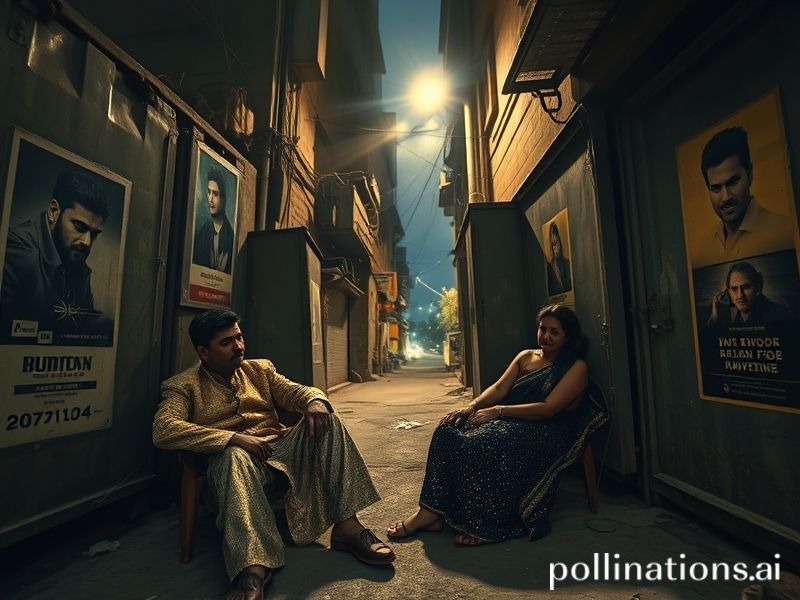Bollywoes: How the World Learns to Love and Loathe India’s Glittering Guilt Machine
Bollywoes: How the World Learns to Love and Loathe India’s Glittering Guilt Machine
By Our Correspondent in a Safe House Somewhere Between Bandra and Netflix HQ
If the global film industry were a bar at closing time, Hollywood would be the loud American bragging about his IPO, Nollywood the Nigerian hustler selling you miracle watches, and Bollywood the impeccably dressed guest who vomits diamonds into the punchbowl—then insists you admire the sparkle. For decades the world has turned to Hindi cinema for three-hour escapism packages complete with Swiss alps, synchronized pelvic thrusts, and a moral lesson wrapped in a sari. Lately, however, the same audience that once queued from Leicester Square to Lagos is noticing something unsavory lurking behind the rhinestones: the “bads” of Bollywood are becoming as exportable as the goods.
Take nepotism, lovingly nicknamed “the Kapoor family business model.” While European film boards fret over gender parity and the Oscars institute inclusion riders, Mumbai still operates a caste system in which surnames open doors faster than talent can locate the handle. The recent death of actor Sushant Singh Rajput—officially suicide, unofficially a referendum on insider-outsider pathology—detonated on Twitter like a Molotov cocktail of grief and memes. International streamers, smelling both blood and subscriber gold, rushed to option investigative specials. The upshot: your Danish cousin now knows what a “nepo baby” is without having to read a headline about the Beckhams.
Meanwhile, the industry’s carbon footprint rivals a medium-sized Gulf nation. Those Swiss song sequences require 200-person crews, private jets, and enough hairspray to punch a new hole in the ozone layer precisely above the Matterhorn. Greta Thunberg presumably files Bollywood dance numbers in the same mental folder as coal plants. Ironically, the same stars who jet to Davos to pontificate on sustainability will board a chartered 747 next week to Udaipur for a 45-second cameo in a wedding-themed blockbuster. Hypocrisy, like curry, travels well.
Off-screen, Bollywood’s leading men have perfected the art of weaponized nostalgia. Aging heroes in hair-dye denial still romance actresses half their age, a practice that would get you ghosted on Tinder in any civilized country. Yet distributors from Dubai to Durban keep buying the fantasy, proving that sexism remains the most reliable global currency after the dollar. The UN’s latest gender-gap report might as well be subtitled “We Watched Three Salman Khan Films and Gave Up.”
Then there’s the soft-power laundering. Government subsidies now flow to historical epics that retcon India’s past into a triumphalist Instagram filter. The result is a cinematic universe where Mughal forts look suspiciously like modern yoga retreats and every emperor speaks in the baritone of a news anchor. International critics call it revisionism; Netflix calls it “trending in 23 countries.” Either way, historians are updating their CVs.
Money, naturally, is multilingual. Global investors—hedge funds, Gulf sheikhs, and that one Malaysian financier still at large—treat Bollywood as a high-yield petting zoo. Box-office numbers are inflated faster than a Turkish lira, enabling circular schemes where profits from Film A are funneled into the marketing budget of Film B, which then buys the streaming rights of Film A. If you think this sounds like a money-laundering manual, congratulations: you’ve just passed the Financial Action Task Force entrance exam.
What does the world actually inherit from this circus? First, a crash course in aspirational cognitive dissonance: audiences in Nairobi or Newark learn to dream in Hindi while ignoring the sweatshops stitching the costumes. Second, a diplomatic hazard. When Canadian Prime Minister Justin Trudeau posed with Bollywood A-listers in 2018, his polling numbers fell faster than a poorly CGI’d villain off a cliff. The takeaway for foreign leaders: never stand between a superstar and his vanity lighting.
And yet, like any guilty pleasure, Bollywood keeps selling. Its bads are simply the side effects of a drug the planet refuses to quit. Until regulators, audiences, or an asteroid intervene, the show will go on—complete with item numbers, Swiss snow, and the faint smell of moral compromise drifting across international borders. Pass the popcorn; it’s probably buttered with something we don’t want to know about.







